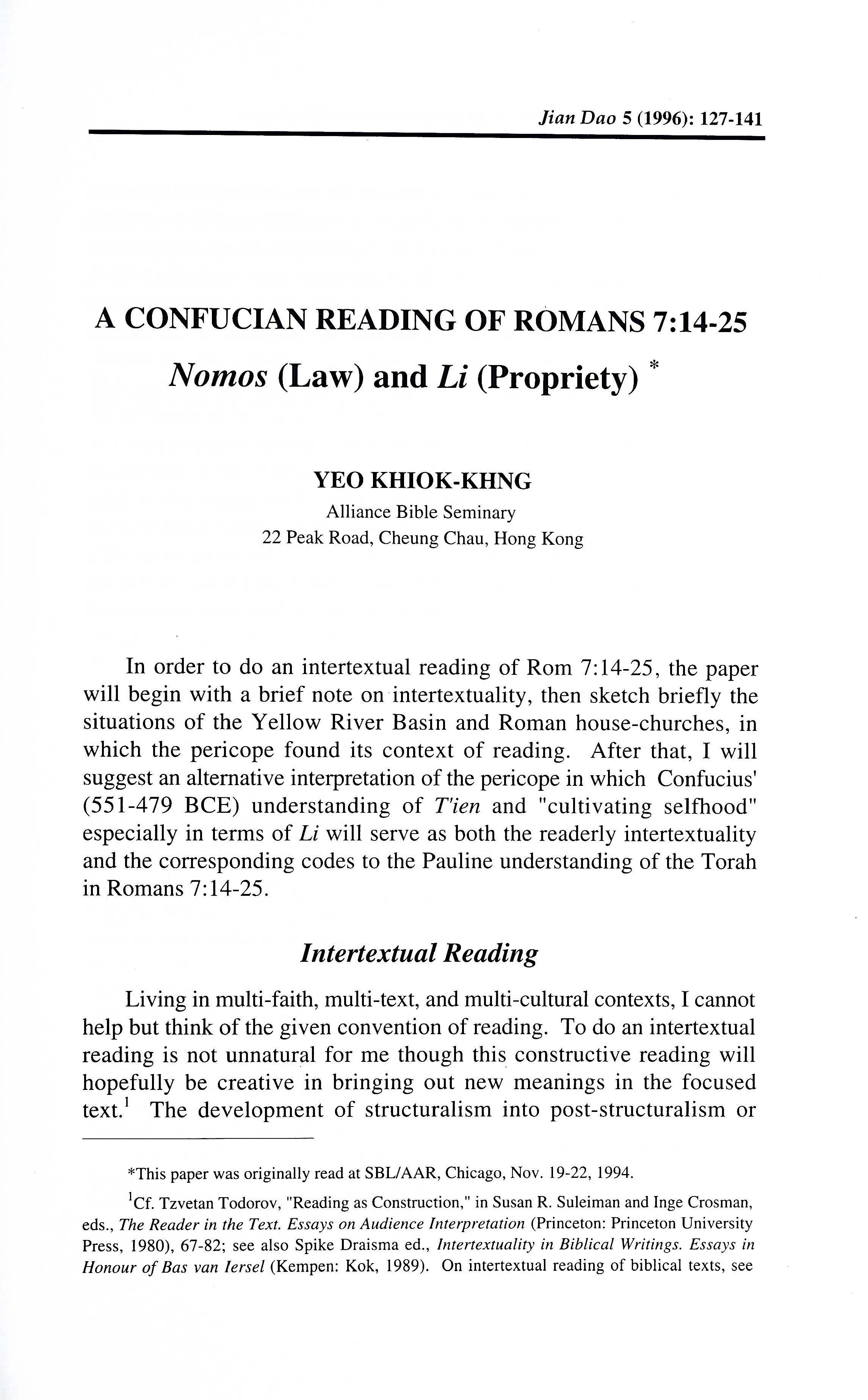A Confucian Reading Of Romans 7:14-25:Nomos(Law) And Li(Propriety)(從儒家角度解讀羅馬書七章14至25節──猶太律法與儒家之禮) / 楊克勤
撮要
作者首先總結羅馬七章14至25節解釋上的論爭,然後再從儒家角度詮釋這段經文。本文大部分是從中國基督徒角度以文本互涉方法詮釋羅馬書七章的「律法」和《論語》的「禮」。作者認為保羅眼中的屬靈生活基本上是屬於群體和倫理層面的,其次才是個人和禮儀層面。這觀點是從儒家的「禮」的角度出發。要過有「禮」的生活,就是一種過培養但不假飾的人際關係,透過蕴含在敬虔尊嚴自然協調而表現出來。這與律己以嚴,待人以寬的做法相同。
這解釋提出一個詮釋的含意:宗教人士遇到的最大難題,就是這些承繼了歷史悠久的神聖傳統和宗教價值觀,有所謂敬虔和宗教情操的人,他們以取悅神為名去逼迫和傷害別人。換言之,愛神而不愛人、與神和好而與人不和是可能的。在亞太區不同信仰群體共存所引起的問題,正好說明這詮釋的含意。
ABSTRACT
The article begins with the a summary of debate about the interpretation of Romans 7:14-25 and offer an alternative interpretation through a Confucian reading of the pericope. The major portion of the article is an intertextual hermeneutics of nomos (law) in Romans 7 and li (propriety) in the Analects from a Chinese Christian perspective. It will be argued that the Pauline view of life in the Spirit is primarily communal and ethical, only secondarily individual and ritualistic. This view is read through the Confucian perspective of li (propriety). To live a life of li, a cultured yet natural pattern of interpersonal relationships that works through spontaneous coordination rooted in reverent dignity is the same as using the Torah without imposing its requirement on others.
Such a reading will render a hermeneutical implication that the greatest issue confronting religious people is that those who have inherited a long tradition of sacredness and religious values often in their piety and religiosity hurt and persecute people in the name of the very God they seek to please. In other words, it is possible for one to love God and yet not love people; it is possible to be set right with God and not right with people. The hermeneutical implication is supported with examples of the problem of co-existence in the multifaith context of the Asia-Pacific region.
原載於《建道學刊》5期(1996年1月),頁127-141。
最新文章
新手牧者研究計劃(三):新手牧者的身心靈狀態 / 盧慧儀
2025 年 11 月 19 日
個體與關係:滕近輝思想中「深化」的靈性觀 / 倪步曉
2025 年 11 月 18 日
香港九龍塘基督教中華宣道會之起源和發展史/陳智衡
2025 年 10 月 20 日
编辑精选
[電子書]困境與抉擇:「建道研究中心30週年誌慶」跨學科研討會論文集/廖炳堂、倪步曉主編
2025 年 1 月 2 日
從梧州到長洲:建道神學院125年的挑戰與恩典 / 陳智衡
2023 年 10 月 1 日
微小教會的見證/高銘謙
2023 年 6 月 1 日







